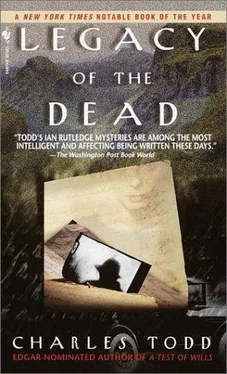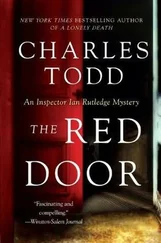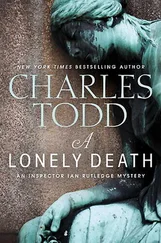Charles Todd - Legacy of the Dead
Здесь есть возможность читать онлайн «Charles Todd - Legacy of the Dead» весь текст электронной книги совершенно бесплатно (целиком полную версию без сокращений). В некоторых случаях можно слушать аудио, скачать через торрент в формате fb2 и присутствует краткое содержание. Жанр: Полицейский детектив, на английском языке. Описание произведения, (предисловие) а так же отзывы посетителей доступны на портале библиотеки ЛибКат.
- Название:Legacy of the Dead
- Автор:
- Жанр:
- Год:неизвестен
- ISBN:нет данных
- Рейтинг книги:5 / 5. Голосов: 1
-
Избранное:Добавить в избранное
- Отзывы:
-
Ваша оценка:
- 100
- 1
- 2
- 3
- 4
- 5
Legacy of the Dead: краткое содержание, описание и аннотация
Предлагаем к чтению аннотацию, описание, краткое содержание или предисловие (зависит от того, что написал сам автор книги «Legacy of the Dead»). Если вы не нашли необходимую информацию о книге — напишите в комментариях, мы постараемся отыскать её.
Legacy of the Dead — читать онлайн бесплатно полную книгу (весь текст) целиком
Ниже представлен текст книги, разбитый по страницам. Система сохранения места последней прочитанной страницы, позволяет с удобством читать онлайн бесплатно книгу «Legacy of the Dead», без необходимости каждый раз заново искать на чём Вы остановились. Поставьте закладку, и сможете в любой момент перейти на страницу, на которой закончили чтение.
Интервал:
Закладка:
Hamish said, “Aye, if the neighbor is an auld biddy who would ha’ relished telling his father tales, I canna’ think Robert was sae foolish.”
“Indeed,” Rutledge said aloud, answering both of them. “Then he could have found another place for her to live until she was able to return to London. If it was your son. Did he have an interest in piping?”
“He studied the pipes as a child. But he didn’t continue. What has that to do with Eleanor Gray?”
“I recall someone telling me that this same officer was helpful in finding pipers to play for the wounded.”
“You needn’t play the pipes to like them. Or to know pipers.”
Rutledge said nothing.
After a moment, Procurator-Fiscal Burns said, “What, pray, has any of this to do with the young woman in Duncarrick? If the Gray woman came north in the spring, she might have gone anywhere in Scotland in the weeks following!”
“That’s true, of course. But it is a beginning, and I’m hopeful that we’ll eventually trace Miss Gray to Glencoe, if that’s where she died.” Rutledge paused, then said almost as an afterthought, “I don’t suppose we’ll ever know the name of the father of the child Fiona MacDonald has had in her keeping. It’s a pity, really. He’s a fine lad, and if he had been mine and I’d died, I’d have hoped my family would claim him in my place.”
Burns regarded him coldly and said nothing.
Rutledge rose and then asked, “Would you have any objections, sir, if I took the prisoner to the place where the bones in question were found?”
“There’s no provision in the law for that!”
“No, sir, I’m well aware that there isn’t. All the same, I need to find the truth about Eleanor Gray, and what the link is between the two women. In a prison cell, it’s very easy for the accused to remain silent and stubborn. Faced with her victim’s grave, she might well break down and confess. It would save a good deal of trouble if she did. I think the case as it stands would be difficult to prove in court.”
“Nonsense! It’s a very sound case indeed.”
“Is it? If I were her lawyer, and clever, I would make it very clear to the jury that while there is living proof of a child, there has been no proof of murder. And the jury might well agree with me.”
There was a startled look in the blue eyes, as if Burns had never considered anything but a guilty verdict.
Leaving, Rutledge was reminded that Drummond’s sister had insisted that the fiscal had been angry with Fiona for refusing to cooperate with Inspector Oliver.
Hamish said, “He didna’ want to hear his son was involved.”
“Yes, I know. Well, that may be true, he may not be involved. Or the fiscal may have been very good at concealing his own suspicions. Still, I don’t think the fiscal was protecting his son when he ordered Fiona held for trial. It would have been the wrong move-if I hadn’t come across Robert Burns’s name, someone else might have. No, there was more behind the decision.”
“Then turn it another way. What’s the use of a trial? No’ to discover the child’s name or parentage but to punish Fiona for killing the mother. To put the blame on someone for a woman’s death. So that when the body is found, it won’t point a finger at the true killer. The likes of the fiscal and the Chief Constable and their friends would protect their own!”
Making his way back to his motorcar, Rutledge shook his head. “No. It can’t be that. But the fiscal’s an intelligent man, and he should have said ‘If someone is claiming my son’s involved in this business, I want you to look into it.’ And then given me a list of people who knew the son well enough to tell me the truth. But he didn’t. And that’s what’s odd.”
As he bent to turn the crank, Rutledge added, “Don’t you see? McKinstry is absolutely right. The verdict on Fiona MacDonald is already in.”
18
The next morning Rutledge received by private messenger permission to take Fiona MacDonald to Glencoe, as long as they were accompanied by a matron and a constable.
It was not how he had wanted to go there. He had thought of it as an expiation, sitting in the fiscal’s office. He had seen it, too, as an excuse for getting Fiona out of that small, dark cell and into the light. A muddle of reasons, none of them wise.
But the sooner he went, the better, before someone changed his mind.
He arranged for sandwiches in a basket to be packed for the journey, and then went out to his motorcar to drive around to the police station.
Oliver wasn’t there. Pringle thought he had gone out the Jedburgh road to look into a theft of a lorry’s contents. “It seems,” Pringle ended wryly, “that the driver fell asleep and ran off the road. When he went to find help dragging the lorry out of the ditch, someone helped himself to the contents instead.” Pringle shrugged. “The driver’s in a rage, but Inspector Oliver isn’t likely to be swayed by that. We had an incident once before where a driver sold off part of the contents and then claimed he’d been robbed. Inspector Oliver has a long memory. You don’t make a fool of him twice!”
Rutledge found himself thinking of the skeleton discovered in the stables at The Reivers. Oliver had gone on from that embarrassment to find the bones in Glencoe Rutledge thanked Pringle and decided to drive out the Jedburgh road himself. But he had hardly reached the outskirts of Duncarrick when his engine spluttered, caught, and then died.
Swearing, he got out to crank it again, but nothing happened. Taking a look at the engine-and attracting two young farm lads who came to peer over his shoulder at the mysteries under the bonnet-he could see nothing wrong. He asked one of the young men to hold the wire while he turned the crank and checked the spark. It was clearly not that. There was fresh petrol in the tank, filled in Jedburgh just the day before. And he could see no indication that anyone had meddled with the car.
In the end, Rutledge commandeered a horse and cart to tow the vehicle (with accompanying humor from the old farmer who didn’t hold with infernal combustion) back into Duncarrick, where it was left to the mercy of the mechanic at the smithy.
He wouldn’t be traveling anywhere with Fiona MacDonald this day. Or tomorrow “And who will be pleased to hear that?” Hamish asked, irony heavy in his voice. “The fiscal?”
“Burns gave permission. But grudgingly.”
Rutledge went back to the hotel and searched the space by the shed where he usually parked the motorcar. A precaution.
He walked around the space, examining the ground. The dust had been scuffed, but no clear footprints were visible except for his own. The rear of the car had been in the shadows cast by the shed standing no more than ten feet away. Easy to crouch unseen there in the darkness late at night and take an ax to a tire, if someone wanted to disable the car. But the tires hadn’t been touched. And as far as Rutledge could tell, the engine hadn’t been damaged either.
He’d just driven the car hard for four days Everyone in Duncarrick knew whose car sat in the hotel yard day after day. No one in his right mind would touch it.
“Unless,” Hamish pointed out, “you’ve tread on toes.”
Rutledge walked to the police station and from Constable Pringle borrowed the key to The Reivers again. The inn wasn’t likely to yield more information than it had, but he wanted to go there on his own and be sure.
Clarence, the cat, followed Rutledge soft-footed from room to room, a silent white ghost at his heels as he took his time in each. He couldn’t have said when he started what it was he wanted here.
Such a place as The Reivers, he thought, was not made for the morning. The echoes of the night would linger still in the air-laughter and voices-someone singing off-key-and the smell of spilled beer and ale, the reek of smoke would drift down the passages. There would be an emptiness, a loneliness, as if the inn stood waiting for the doors to swing open again and new patrons to stride through them, thirsty for a pint and the companionship that went with it.
Читать дальшеИнтервал:
Закладка:
Похожие книги на «Legacy of the Dead»
Представляем Вашему вниманию похожие книги на «Legacy of the Dead» списком для выбора. Мы отобрали схожую по названию и смыслу литературу в надежде предоставить читателям больше вариантов отыскать новые, интересные, ещё непрочитанные произведения.
Обсуждение, отзывы о книге «Legacy of the Dead» и просто собственные мнения читателей. Оставьте ваши комментарии, напишите, что Вы думаете о произведении, его смысле или главных героях. Укажите что конкретно понравилось, а что нет, и почему Вы так считаете.












